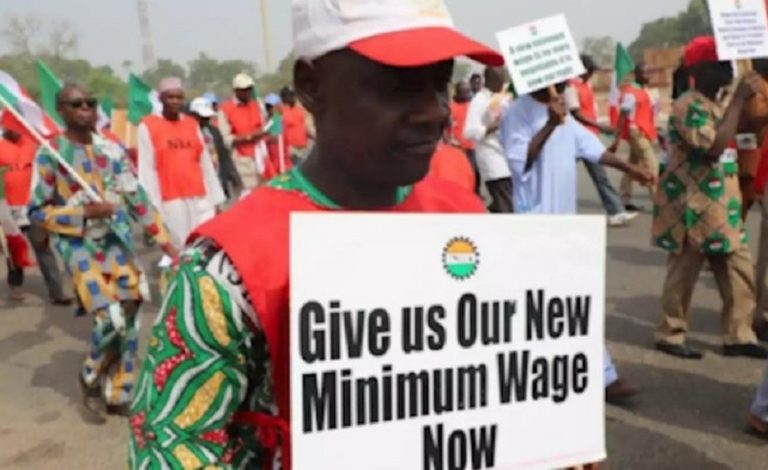
The Federal Government of Nigeria and organized labor unions have agreed on a new minimum wage of N70,000 for Nigerian workers. This decision was reached after extensive negotiations and a nationwide strike by labor unions demanding better pay and working conditions.
The announcement was made on Thursday following a crucial meeting between President Bola Tinubu and leaders of the Nigeria Labour Congress (NLC) and the Trade Union Congress (TUC) at the State House, Abuja.
The Minister of Information and National Orientation, Mohammed Idris, briefed newsmen about the outcome of the meeting, confirming that both parties had agreed on the new minimum wage.
Register for Tekedia Mini-MBA edition 19 (Feb 9 – May 2, 2026): big discounts for early bird.
Tekedia AI in Business Masterclass opens registrations.
Join Tekedia Capital Syndicate and co-invest in great global startups.
Register for Tekedia AI Lab: From Technical Design to Deployment (next edition begins Jan 24 2026).
Idris also noted that subsequent reviews of the minimum wage would now occur every three years, as opposed to the current five-year interval.
Before this agreement, the Federal Government had initially offered N62,000 as the new minimum wage. But labor unions demanded N250,000, a substantial increase reflecting the rising cost of living in the country.
The journey to this new minimum wage has been fraught with tension and conflict. Labor unions have been vocal about their dissatisfaction with the previous salary, leading to several rounds of negotiations.
Backstory
Earlier this year, labor unions embarked on a nationwide strike to protest the inadequate wages and poor working conditions faced by many Nigerian workers. The strike action was aimed at pressuring the government to address the dire economic situation and implement a more livable minimum wage.
Comrade Joe Ajaero, President of the NLC, stated, “We had to take to the streets to make our voices heard. Nigerian workers deserve better pay, and we will not stop until we achieve that.”
The strikes caused significant disruptions across the country, affecting various sectors of the economy and highlighting the critical need for a resolution.
In response to the strikes and mounting pressure, the Federal Government proposed increasing the minimum wage to N62,000. However, labor unions rejected this offer, deeming it insufficient given the economic realities faced by workers.
“The government’s initial offer was not enough. We need a wage that reflects the current cost of living and allows workers to live with dignity,” said Comrade Festus Usifo, President of the TUC.
Challenges with Implementation at State and Local Govt. Levels
The major challenge of implementing the N70,000 minimum wage lies with the states and Local Government Areas (LGAs), many of which have been vocal about the unsustainability of such an increase. The previous minimum wage of N30,000, which expired in April, had not been fully implemented by many states, citing financial constraints.
Currently, several state governments have argued that their revenues are insufficient to meet the new wage demands. This has raised concerns about the practical implementation of the N70,000 minimum wage across the country.
Following the meeting at the Presidential Villa, labor leaders who had insisted on an N250,000 minimum wage, said they had accepted the offer because of the other incentives attached and the president’s promise of a review every three years.
These incentives are expected to include various measures to alleviate the financial burden on workers and improve their overall welfare. The specifics of these incentives have yet to be fully detailed but are anticipated to address critical areas such as housing, healthcare, and transportation.
While the new minimum wage is a better offer toward improving the living standards of Nigerian workers, its successful implementation has presented a fresh challenge that many states will find difficult to tackle.
Although there has been an increase in federal allocations to states and local governments, stakeholders have said that only a few states in the country can fully implement an N70,000 minimum wage.
The implementation is deemed more challenging in the light of a recent Supreme Court ruling, which upholds the autonomy of local governments, ordering that their allocations be wired directly into local governments’, not state accounts.
Against this backdrop, there is mounting concern that most LGAs will not be funded enough to implement the new minimum wage.
However, compared to several other African countries, the N70,000 minimum wage, which is only $43, is considered poor by many Nigerians who also noted that it can’t buy up to a bag of rice.
“In 2014 it was 18k equivalent to $100 and could buy you 3 bags of rice (you can start a rice retail business with that),” a concern Nigerian posted on X.
“Today at N70k it’s equivalent to $42 & can’t buy you a bag of rice, this is the definition of regression…”



